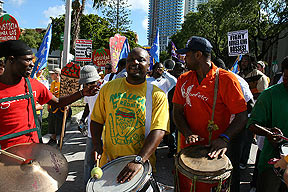Fellow workers:
Right now, the Coalition of Immokalee Workers are marching in the streets of Miami, as part of their campaign to win wage increases for tomato pickers whose tomatoes are bought by Burger King. Here’s why.
Today, farmworkers from Immokalee, Florida and their religious, labor, and student allies are marching 9 miles through the streets of Miami to the world headquarters of Burger King.
Today we march because there is a human rights crisis in the fields of Florida. Tomato pickers who harvest tomatoes for the fast-food industry face sweatshop conditions every day, including sub-poverty, stagnant wages (pickers earn about $10,000/year on average and a per-bucket piece rate that has not changed significantly since 1978) and the denial of basic labor rights.
Today we march because to earn minimum wage for a 10-hour day, a tomato picker in Florida must harvest over TWO AND A HALF TONS of tomatoes.
Today we are marching because, in the most extreme cases, farmworkers face conditions of modern-day slavery. We have seen five slavery operations in the fields brought to the federal courts since 1997, helping to liberate over 1,000 workers and sending 10 employers to prison.
Today we march because Burger King contributes directly to farmworkers' poverty through its high-volume purchasing practices, for decades demanding the cheapest tomatoes possible but never demanding fair treatment or just wages for the people who harvest those tomatoes.
Today we are marching because we have hope. In the past years farmworkers and consumers have united to bring Yum Brands (the world’s largest restaurant corporation) and McDonald’s to the table to help improve tomato pickers’ wages and working conditions.
Today we march because, in the wake of these changes, we stand on the threshold of a more modern, more humane agricultural industry in Florida. Yet, facing this historic opportunity, Burger King has responded with lies and excuses to not take responsibility.
Today we are marching to say ENOUGH.
Today we are marching for the dignity of workers, consumers, and our communities alike.
JOIN US as we demand justice. Rally at Burger King headquarters this afternoon, 3:30 to 6:00, at Blue Lagoon Drive and NW 57 Ave.
—Coalition of Immokalee Workers (2007-11-30): Why We March
Migrant farmworkers in southern Florida spend every workday picking tomatoes by hand for 10 to 12 hours at a stretch, at a piece rate of $0.40–$0.45 for every 32 pound bucket that they fill (or about 1¼ to 1½ pennies per pound of tomatoes picked). Since that piece rate hasn’t changed since 1978, farmworker’s real wages have actually fallen by more than two thirds over the past three decades, thanks to the combination of the farm bosses’ efforts to stonewall wage increases and the Federal Reserve’s efforts to keep the market safe for finance capital by eating up the value of other people’s wages.
The Coalition of Immokalee Workers, a farmworkers’ union founded in 1993 and organized along community workers’ council lines, has been working to change all that. They are mostly immigrants from Mexico, Central America, and the Caribbean; many of them have no legal immigration papers; they are pretty near all mestizo, Indian, or Black; they have to speak at least four different languages amongst themselves; they are often heavily in debt to coyotes or labor sharks for the cost of their travel to the U.S.; they get no benefits and no overtime; they have no fixed place of employment and get work from day to day only at the pleasure of the growers; they work at many different sites spread out anywhere from 10–100 miles from their homes; they often have to move to follow work over the course of the year; and they are extremely poor (most tomato pickers live on about $7,500–$10,000 per year, and spend months with little or no work when the harvesting season ends). But in the face of all that, and across lines of race, culture, nationality, and language, the C.I.W. have organized themselves anyway, through efforts that are nothing short of heroic, and they have done it as a wildcat union with no recognition from the federal labor bureaucracy and little outside help from the organized labor establishment. By using creative nonviolent tactics that would be completely illegal if they were subject to the bureaucratic discipline of the Taft-Hartley Act, the C.I.W. has won major victories on wages and conditions over the past two years. They have bypassed the approved channels of collective bargaining between select union reps and the boss, and gone up the supply chain to pressure the tomato buyers, because they realized that they can exercise a lot more leverage against highly visible corporations with brands to protect than they can in dealing with a cartel of government-subsidized vegetable growers that most people outside of southern Florida wouldn’t know from Adam.
The C.I.W.’s creative use of moral suasion and secondary boycott tactics have already won them agreements with Taco Bell (in 2005) and then McDonald’s (this past spring), which almost doubled the effective piece rate for tomatoes picked for these restaurants. They established a system for pass-through payments, under which participating restaurants agreed to pay a bonus of an additional penny per pound of tomatoes bought, which an independent accountant distributed to the pickers at the farm that the restaurant bought from. Each individual agreement makes a significant but relatively small increase in the worker’s effective wages — about $100 more per worker per year in the case of the Taco Bell agreement — but each victory won means a concrete increase in wages, and an easier road to getting the pass-through system adopted industry-wide, which would in the end nearly double tomato-pickers’ annual income.
Since the victory in the McDonald’s campaign, the C.I.W. have turned their attention from the Clown to the Crown, and Burger King Inc. has mostly followed the same path as Yum! Brands and McDonald’s did. First they ignored them. Then they stonewalled them. Then they tried to make up some excuses, and had a P.R. flack make an ill-considered little funny about how distressed farmworkers should apply for a job at their stores. (If I recall correctly, that same exact joke was recycled from Taco Bell.) Unfortunately, before moving on to the inevitable last step — in which they cave, the C.I.W. wins, the farm workers get a bonus, and the fast food chain gets to issue a press release patting themselves on the back for their humanitarian buying standards — Burger King has decided to make a detour through some dirty anti-labor joint maneuvers with the Florida tomato growers’ cartel.
The Florida Tomato Growers’ Exchange is a cartel and legislative lobby which represents more than 90% of Florida’s tomato growers. It has recently set out to destroy the pass-through system. Since the bonuses are paid by the buyers, the system costs the farm bosses nothing to implement, and I’m not entirely clear what their interest is here (although, if I had to guess, they are probably worried that widespread success for the system would raise workers’ expectations about pay and conditions). Burger King and the cartel recently teamed up on a joint P.R. campaign intended to convince the eating public that farm workers are actually richer than most minimum-wage workers, and besides which the farm bosses pay for charity houses and scholarships for their poor kids. (The basis for their argument is a comparison of estimated hourly wages. Of course, the reliability of those hours, or the total annual income, is never mentioned.)
Meanwhile, the F.T.G.E. and Burger King have endorsed the cartel’s yellow-dog auditing agency, S.A.F.E. Reps from Burger King and the tomato cartel have also teamed up with a Republican state congressman to discredit the C.I.W., by claiming that the set-up looks fishy, denouncing nonviolent protest and consumer boycotts as extortion,
and then insinuating that the pass-through system is little more than a channel for graft, and that C.I.W. is pocketing a skim. Since they have no empirical evidence for this claim, they have relied on innuendo and unsubstantiated soundbites, and they have refused to give any backing for their claims, while steadfastly ignoring the offers of participating restaurants, who dismiss the claim, to explain how the system works.
Meanwhile, Reggie Brown, the tomato cartel’s professional spokesdick, has invoked the spectre of federal prosecution, claiming that the C.I.W.’s voluntary pass-through system somehow violates federal antitrust and racketeering laws. Brown has also denounced the freely bargained agreements as un-American
, apparently because they organized bosses’ divine right to control the terms of wage negotiations with no input from workers organizations or, for that matter, their customers. The cartel has publicly warned its members not to participate, and, behind the scenes, they have apparently threatened any member who participates in the penny-per-pound pass-through system with a $100,000 fine. As a result, while Taco Bell and McDonald’s are still willing to participate in the bonus system, all of the growers have, as of now, announced that they will not participate next year.
Well, fine. If they want to play hardball, let them play hardball. Workers are more than capable of hitting that hardball right back. The main danger, at this point, is that, with spokesdick Brown’s muttered fulminations about federal prosecution and the bosses’ enlistment of state government creeps on their side, this fight may get kicked from creative, nonviolent industrial action, over into the stifling atmosphere of legal and regulatory action. As long as the C.I.W., and the workers and consumers acting in solidarity with them, keep away from political action, we have all the resources we need to beat them. The Taco Bell boycott was won, after years of stonewalling, through fight-to-win tactics like working with sympathetic students to get Taco Bell franchises booted out of campus dining halls. This fight can be won through more of the same, and better. Never forget that the workers are more powerful with their hands in their pockets than all the weapons and property that the plutocrats have to attack us. As Robin Blumner writes in the St. Petersburg Times:
The coalition initially tried to convince the growers to pay the added penny but they wouldn’t budge, so the group sought to enlist fast-food giants instead. Go to the major buyers who have reputations to uphold and have them pay the penny. It was a brilliant stroke.
Consumers tend to respond well to a company they think is socially responsible, and the converse is true.
… According to [C.I.W. rep Julia] Perkins, there are growers willing to help their workers secure this additional wage but the exchange is standing in the way.
Both Yum Brands and McDonald’s say they are committed to their agreement with the coalition. It appears that for now, however, things are on hold until the coalition and these companies can figure out a way around the intransigence of the exchange.
This is how it often is in labor fights: Employers dig in so hard that even an extra penny – one that they’re not even paying – is too much to ask. No wonder they can’t find Americans to do this work.
In the meantime, the coalition is trying to convince Burger King Corp. to come aboard, and is planning a demonstration at its headquarters in Miami on Friday. Keva Silversmith, a Burger King representative, says that the Florida growers have a right to run their business how they see fit.
I guess expending the $250,000 it would cost Burger King is simply too much for a company that is paying its CEO $2.35-million a year.
Okay consumers, sic ’em.
— Robin Blumner, St. Petersburg Times (2007-11-25): At a penny per pound, a little adds up to a lot
Further reading:











